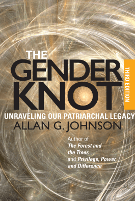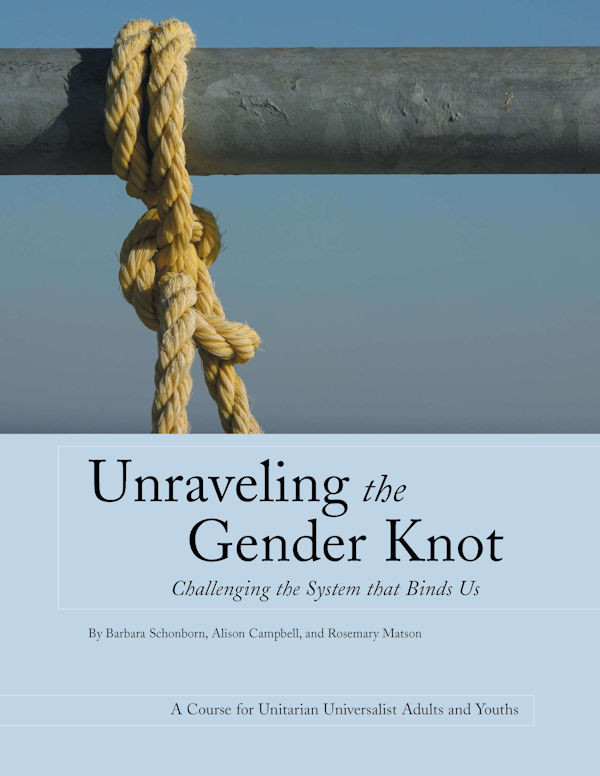Challenging the System that Binds Us
Topics in the seven two-hour sessions include gender, religion, feminism, economics, invisibility and denial, and how to challenge the patriarchal system.
Participants and co-leaders:
- Examine religious writings that influence our beliefs about women and men
- Study how the patriarchal system shapes women and men
- Identify and practice confronting patriarchal actions by organizations, other people, and ourselves
Participants learn that:
- We are not responsible for our inherited patriarchal system, and we participate in it.
- Paths of least resistance are easy to take and hard to recognize.
- We can change our attitudes and behavior, and can influence others.
A course for Unitarian Universalist adults and youths and our friends, published by UUWR in 2004. Course materials include a 100-page detailed course guide for co-leaders with handouts for participants. Also obtain two documentary films: Who's Counting? Marilyn Waring on Sex, Lies and Global Economics (National Film Board of Canada, 1995) and The Gods of Our Fathers (Green Lion Productions, 1994). Links are below.
 The course reference book is The Gender Knot: Unraveling Our Patriarchal Legacy, by Allan G. Johnson. The 3rd edition of The Gender Knot includes a new chapter on the causes and social invisibility of men’s violence. It is also available as an audiobook.
The course reference book is The Gender Knot: Unraveling Our Patriarchal Legacy, by Allan G. Johnson. The 3rd edition of The Gender Knot includes a new chapter on the causes and social invisibility of men’s violence. It is also available as an audiobook.
"The Gender Knot, Allan G. Johnson’s response to the pain and confusion that men and women experience by living with gender inequality, explains what patriarchy is and isn’t, how it works, and what gets in the way of understanding and doing something about it. Johnson’s simple yet powerful approach avoids the paralyzing trap of guilt, blame, anger, and defensive denial that often result from conversations about gender. He shows how we all participate in an oppressive system we didn’t create and how each of us can contribute towards its dissolution. He argues persuasively that something much better is possible and that our individual choices matter more than we can ever know.” (Amazon.com)
WHO'S COUNTING?
In this feature-length documentary, Marilyn Waring demystifies the language of economics by defining it as a value system in which all goods and activities are related only to their monetary value. As a result, unpaid work (usually performed by women) is unrecognized while activities that may be environmentally and socially detrimental are deemed productive. Waring maps out an alternative vision based on the idea of time as the new currency.
Watch it online via the National Film Board of Canada:
http://www.nfb.ca/film/whos_counting
Or you can download it here (there is a charge):
http://www.nfb.ca/film/whos_counting/download
The Human Race Series: The Gods of Our Fathers
There is nothing innate in patriarchy and militarism. We can change our culture.
51 minutes; Closed Captioned
Directed by Anne Henderson
Produced by Catherine Mullins & Marrin Canell
Green Lion Productions -- Hosted by Gwynne Dyer
Human nature is not fixed. We can and do reshape ourselves every time we change our culture. Nor is there anything natural or innate in male domination.
Host Gwynne Dyer explores the evolution of patriarchy and the subsequent rise of militarism in ancient Egypt. In ancient villages along the Nile, patriarchy was adopted as one effective way of organizing mass societies. But the world is different now, and it's time to find alternatives to hierarchies and militarization.
"Male domination is not natural, and neither is equality of the sexes -- it all depends. Same goes for whether we are warlike or peaceful, democratic or authoritarian. Change the way we live, and you may also change the way we behave toward each other." Gywnne Dyer
Find more information at the National Film Board of Canada website:
http://www.onf-nfb.gc.ca/eng/collection/film/?id=31900
Or try YouTube: https://www.youtube.com/watch?v=jGTrnYzDCsU
More details ...
The course was developed by two Unitarian Universalists: Barbara G. Schonborn, PhD, a course developer and teacher of teachers; the late Rosemary Matson, BA, a writer, lecturer, and activist leader; and their friend and colleague the late Alison Campbell, MA, a teacher and writer.
Course development was supported by:
- Unitarian Sunday School Society
- Fund for Unitarian Universalism
- Margaret Fuller Award Committee of the UU Women’s Federation
- Alison Ely Campbell Memorial Fund
- UU Women & Religion
Members and friends in 20 UU congregations pilot-tested the course.
Session Topics
Orientation Meeting (recommended)
Session 1. Gender and the Patriarchal System
Welcome and Introductions
How We Got Our Genders: An Activity
Purposes of the Course
The UUA Women and Religion Resolution and Seeds of Change
What is the Patriarchal System?
Paths of Least Resistance
Session 2. Religion and the Patriarchal System
Religious Literature (Heroes, Issues of Sexuality, Reproduction)
Religious Institutions and Decision-Making Power
Writers and Interpreters of Religious Literature
Historical Background
Women and Men Objecting and Reinterpreting
Session 3. Feminism and the Patriarchal System
Definitions of Feminism
Backlash Against Feminism
Three Strands of Feminism
Supporting One Another in Working for Change
Session 4. (optional: 2 sessions) Economics and the Patriarchal System
Film Who’s Counting? Marilyn Waring on Sex, Lies and Global Economics
Gross Domestic Product Figures Recognize No Value But Money
Unpaid Work is Discounted
Destructive Activities are Valued If They Generate Cash Flow; No Debit Side
Non-Monetary Human Values are Not Recognized
Time-Use Data Indicate
Communities’ Needs
Discussion of the Film, and Evidence of the Patriarchal System
Session 5. Thinking About Patriarchy
Is Patriarchy Essential?
Military Service and War
Work in the Patriarchal System
Sex in the Patriarchal System
Film The Gods of Our Fathers
Session 6. Invisibility and Denial
Invisibility of Women and Men
Invisibility of Male Violence
Denial of the Patriarchal System
Woman Power
Session 7. How to Challenge the Patriarchal System
Taking Responsibility
How To Make Change
What’s In It For Me?
Questions? Ask
Barbara Schonborn
1963 Rock St #19
Mountain View, CA 94043-2513
barbara.schonborn@stanfordalumni.org
Tel: (650) 967-6756
Sample Activity: The Wall Falls Down (in Session 5)
ASK the group to name barriers to changing the patriarchal system. Write the list on a flip chart or board. (approx 4 minutes)
INVITE participants to write one barrier on a 3x5 or 4x6 card. It’s okay if two or more participants select the same barrier. (approx 2 minutes)
ASK participants to write on the back of their card one thing (or more) they can do to make the barrier fall. (approx 5 minutes)
ASK participants to stand as they are able, take their cards with them, and align themselves to form a wall. The wall may encircle the room. (approx 2 minutes to get in position)
INVITE participants to name their barrier and tell what they can do to make the barrier fall. Any sequence is fine.
After each participant has had their turn to speak, instruct them to move away or sit down. LEAD the group in chanting once, “The wall falls down!”
After all participants have sat down, the barriers, or walls, will be gone in imagination.
ASK: How do you feel about the barriers? About your actions?




